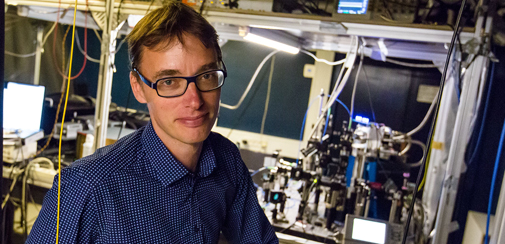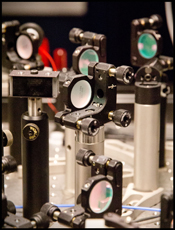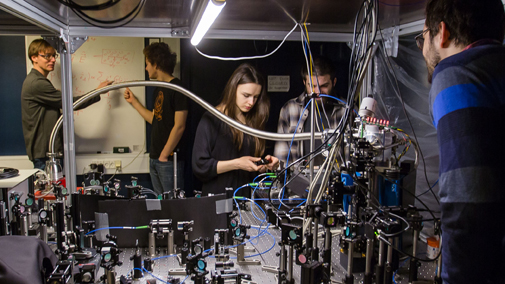Physicist Peter Lodahl receives prestigious EliteForsk Award
Peter Lodahl, professor of quantum physics at the Niels Bohr Institute at the University of Copenhagen has received the prestigious Danish elite researcher award, the EliteForsk Award 2016. Peter Lodahl works with experimental quantum physics and studies quantum computers and quantum networks based on photons (light particles).

Peter Lodahl, professor of quantum physics at the Niels Bohr Institute at the University of Copenhagen has received the prestigious Danish elite researcher award, the EliteForsk Award 2016.
What drives Peter Lodahl is curiosity – the curiosity to understand that strange quantum mechanics. That is how it has been since high school and that is how it still is. “What fascinates me it to understand and control the microscopic world of atoms and photons. The process of science is a journey of discovery into a new world. It is extremely demanding, but also incredibly exciting,” thinks Peter Lodahl, professor and head of the Quantum Photonic research group at the Niels Bohr Institute at the University of Copenhagen.
Peter Lodahl received his M.Sc. in physics from Aarhus University in 1997. After receiving his PhD in quantum physics from the Niels Bohr Institute in 2000, he began an international career as a researcher at the prestigious universities, Caltech in the United States, where he was from 2001 to 2002 and Twente University in the Netherlands, where he was from 2002 to 2005. He then returned to Denmark, where he built up his own research group, Quantum Photonics at DTU. Since 2011 he has been working at the Niels Bohr Institute as a professor and head of his own research group, Quantum Photonics.

Peter Lodahl works with experimental quantum physics and studies quantum computers and quantum networks based on photons (light particles).
The strange quantum physics
Quantum physics deals with the properties of matter at the atomic level and the laws of quantum physics are fundamentally different than those we know from ‘classical physics’, which describe the macroscopic world around us. In quantum physics, an atom or a photon can be in two different places at once, or two objects can be ‘entangled’, i.e. that if you measure one of the objects, then it immediately affects the other – even if it is far away.
It is these strange quantum phenomena that Peter Lodahl studies so that they can be used for new revolutionary applications. He works with quantum photonics to create the circuits of the future based on light (photons) instead of electrons – in other words, photonics instead of electronics.
“We are working to create a quantum internet, where, among other things, you would be able to encrypt messages that are completely impossible to crack, or which can be used to make gigantic calculations of large and complex problems that traditional computers do not have sufficient processing power to solve,” explains Peter Lodahl.
Revolutionary before and now
The research takes place at the Niels Bohr Institute, where the foundation for quantum physics was developed by Niels Bohr, who in 1913 published his groundbreaking Atomic Model, which revolutionised our understanding of atoms. Peter Lodahl explains that back then they worked to describe how a quantum mechanical system would behave theoretically, but now – 100 years later, a new revolution has taken place. Today, the researchers can realise such experiments and the strange quantum phenomena are commonplace in their laboratories.
But even though experiments in quantum physics are now commonplace, there is nothing that is standard. As a top-level researcher it is not enough to carry out experiments – you also have to invent and develop new experimental equipment. Researchers in quantum photonics work with extremely small photonic crystal membranes – the width of the membrane is 25 microns (1 micron is a thousandth of a milimeter), and the thickness is 150 nanometers (1 nanometer is a thousandth of a micron). They developed the photonic crystals themselves and it is also the researchers who build the complex arrays, consisting of large tables with a forest of mirrors that will send laser light around the labyrinthine routes and measuring equipment that can register quantum optical measurements on the atomic level with extreme precision.

“It is a very great recognition and honour not just for me, but not the least for my very talented research group, which has worked to develop our research over the past 10 years. Successful research involves a high degree of teamwork,” says Peter Lodahl, who is here seen to the left in the photo.
Top international research
Peter Lodahl believes that to be a successful researcher you have to have an intrinsic love of science and research, but certainly also have to have a drive to succeed. And you have to be good at a lot of things – it is not enough to just be an expert in a field of research, you also have to be a good leader and to succeed in research you also have to be able to assemble a team of extremely talented people – and challenge them and get them to thrive and be creative.
Peter Lodahl does this all in his own quiet way. His research is at a top level internationally and this has been rewarded with the prestigious EliteForsk Award.
“It is a very great recognition and honour not just for me, but not the least for my very talented research group, which has worked to develop our research over the past 10 years. Successful research involves a high degree of teamwork,” says Peter Lodahl.
He will use the award money to treat his patient family with a trip to New Zealand. That was where he met his wife on a backpacking trip and now they would like to take a trip with their two boys, ages 6 and 7, to the exciting country with beautiful nature.
This year’s five EliteForsk Awards will be handed out by Crown Princess Mary and the Minister for Higher Education and Science Esben Lunde Larsen at an event at the Glyptotek on 25 February.

Peter Lodahl, Professor in the research group Quantum Photonics, Niels Bohr Institute at the Universitet of Copenhagen, Email: lodahl@nbi.ku.dk, Phone: +45 35 32 53 06
